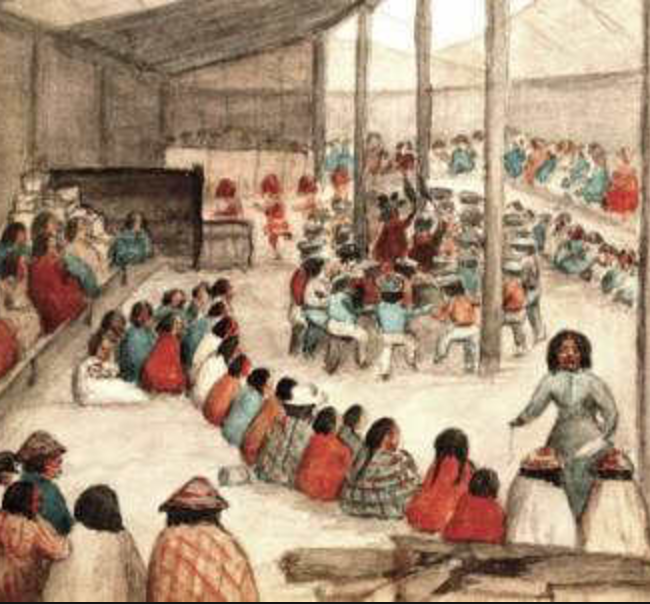Potlatch

As a youth I was fascinated by a custom practiced among Pacific Northwest Native Americans called the Potlatch. I capitalize the Chinook term here, though my OED does not, because it seems every bit as sacred as Christmas and Easter.
Having accumulated much, a person (often a chief) would give away or burn all possessions and start afresh. Though my dictionary implies this was a show of wealth and prestige rather than generosity and humility, I’d say Christmas or any show of charity and humility is practiced with similar mixed motives, so why quibble?
Wade and I have been engaged in a similar practice as we downsize and move to a smaller, more affordable home, though one we hope to improve. I got practice for this in October by emptying my public storage unit in Los Angeles of my parents’ library and a few pieces of their furniture.
I was ruthless in finding new homes for their books, though I did glean three boxes of books and memorabilia to send home. About 35 boxes of books went to a used book store in the suburb where they lived. The furniture went mostly to family, thankfully, though a few pieces found their way to Mexico thanks to my brother’s enterprising neighbor.
My parents were not hoarders in the problematic sense, but they did hoard memories and books. Those “sacramentals” whose stories we knew we often kept, but the ones whose stories have been lost to us easily wound up in the yard sale after my mom’s death. Yet the books also contained “sacramentals”: postcards, photos, news articles, letters, poems, etc. that I needed to remove before giving up the books.
Maya Angelou shared her steely resolve with me through a book of hers I was reading in my morning prayers during that process, one I had found in one of those little lending libraries in a neighbor’s front yard. She could be sentimental and nostalgic, but also realistic and pragmatic, and she helped me recognize the grief and nostalgia of my enterprise as well as its practicality and necessity.
This October pilgrimage prepared me for our December/January Potlatch. Wade, the true materialist of the household, nonetheless loves giving up things just as much as acquiring them, and has made multiple trips to our neighborhood Habitat for Humanity ReStore, delighting its volunteers with every batch of items we will no longer have room for or have fallen into disuse.
As it was my job with my original family to empty my parents’ bookshelves, so too I needed to prune my own overflowing library, an exercise that reveals my present priorities. My books about theology, church organization, and interim ministry were the easiest to surrender, but the books about spirituality will stay with me for now, including my Henri Nouwen collection.
My collections of books by Gore Vidal and Paulo Coelho, LGBT authors and other contemporary writers I deeply appreciated reading, but can release to keep books that changed my life and make room for those I hope to read. And of course, my volumes of poetry and art will stay. A local seminary library has benefited from my literary Potlatch.
My many boxes of personal and professional files I am still sorting for my archive at the Center for LGBTQ and Gender Studies in Religion at the Pacific School of Religion. Many boxes were sent years ago, many are still to be reviewed. I have given up my desire for putting together a scrapbook, wanting rather to “move on” rather than be kept in the past.
These archives serve as the “final resting place” of the papers of such folk and ministries as John McNeill, Janie Spahr, and the Lazarus Project (to name a few) and I would urge you to make a donation to preserve them, and include them in your will. Write to CLGS, Pacific School of Religion, 1798 Scenic Avenue, Berkeley, CA 94709, call toll-free 800-999-0528, email clgs@clgs.org, or visit website here.
The first sermon I gave to an LGBT congregation, MCC Hartford in 1974, was entitled “Letting Go.” Coming Out is ultimately about letting go, whether coming out sexually or coming out spiritually. In a post entitled “Spiritual Picassos,” I described spirituality as a process like Picasso’s life’s work, letting go of unnecessary lines in his paintings and drawings to suggest the essence of his subject.
In October I found a big box of my childhood writings: stories and poetry. When I mentioned I was surprised that there were so many, my brother reminded me, “You were always writing stories.” Somewhat arbitrarily, I selected a few for my archive and tossed the rest, so impatient was I to let go of the dross of my life!
However, one story I rescued long ago was my first childhood attempt to write a story from the Bible, the story of Joseph and his brothers. His having to let go of his family, country, safety and security, believing in his dreams, spoke to my spiritual imagination.
“You intended this for evil,” Joseph later told his brothers who had sold him into slavery, “but God intended it for good.” As I think back on my life, disappointed and disregarded by the church alongside my LGBT sisters and brothers, there is no doubt our exclusion was evil, but God has used the injustice for good to those who follow.
Copyright © 2017 by Chris R. Glaser. Permission granted for non-profit use with attribution of author and blogsite. Other rights reserved.
Vist Chris’ website Progressive Christian Reflections
